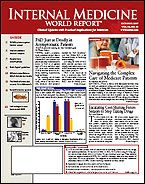Publication
Article
Internal Medicine World Report
Are You at Risk for Atrial Fibrillation?
What Is AF, and Why Is It a Problem?
Each year, approximately 160,000 Americans are diagnosed with atrial fibrillation (AF). AF means the heart does not beat in a regular way; that is, the rhythm of the heart beat is abnormal. This happens when the upper chambers of the heart (called atria) contract in an inconsistent manner with the lower chambers of the heart (the ventricles) and produce an irregular heart beat. This can signal trouble.
When the heart is not producing a regular beat, it may disrupt the regular blood flow from your heart to the rest of your body. In AF, the blood may not be completely pumped out of the heart, so it may pool and clot. If the clotted blood in the atria then leaves the heart and gets caught in a blood vessel (an artery) in the brain, a stroke will occur.
Patients who have been told they have AF are at risk of having a stroke. If you have AF, your risk of having a stroke is 3 to 5 times greater than for other people. Approximately 15% of the strokes that people have are caused by AF.
How Often Does AF Occur?
AF could be a 1-time event, a permanent situation, or change from time to time. Doctors divide AF into 4 types, according to the frequency in which it occurs:
1. AF that lasts less than 48 hours is called "acute or recent-onset AF."
2. Some patients have only 1 episode a year, or have an abnormal heart beat most of the time, but the episodes end on their own; this type is called "paroxysmal AF."
3. The patient continually experiences AF, but treatment with specific medications or with electrical shock to the heart may restore the normal heart rhythm. However, AF may return after treatment, so visiting your doctor on a regular basis may be good. This type is called "persistent AF."
4. Finally, when a patient always experiences AF and restoring a regular heart beat is either not possible or not recommended, that patient has "permanent AF."
What Causes AF?
1. The most common causes of AF are changes in the heart's structure that develop because of previous heart problems or heart disease, including heart attack and heart failure, or abnormalities such as congenital heart or valve defects.
2. Surgery, especially heart surgery, can often cause stress, which leads to abnormal heart beat. AF occurs in almost half of all patients who have heart surgery.
3. Lung problems, such as chronic lung disease, pulmonary blood clots, emphysema, asthma, and pneumonia, can also cause AF.
Who Is at Risk for AF?
People with any of the following conditions may be at some risk for developing AF:
Aging: The older you are, the greater your risk of AF. As people age, the heart's structure and its electrical system change, which may cause the normal heart rhythm to fail.
Heart disease: Anyone with heart disease, valve problems, or a history of heart attack or heart surgery is at an increased risk of developing AF.
Other chronic conditions: People with thyroid problems, high blood pressure, sleep apnea, or other medical problems, including viral infections.
Drugs/Alcohol: Using stimulants, including medications, caffeine, tobacco, or alcohol.
Sick sinus syndrome: this occurs when the sinoatrial (SA) node, the heart's natural pacemaker, stops functioning properly.
Family history of AF: Some families are at increased risk of AF, so if anyone in your family has it, you may want to ask your doctor if you are at risk too.
What Symptoms Should I Watch For?
1. Some people with AF have no symptoms, and they don't know that they have AF until their doctor discovers it. But not having symptoms does not reduce the risk for serious complications.
2. Patients with acute or recent-onset, or those with paroxysmal AF may experience palpitations-a sensation of a rapid and irregular heart beat.
3. Those with persistent or permanent AF usually don't notice palpitations as much, most likely because their heartbeat is always irregular. However, such patients may have:
- Weakness
- Lightheadedness
- Shortness of breath
- Chest pain.
What Are the Treatment Options?
If you worry or suspect you may have AF, make an appointment to see your doctor. Based on the evaluation, your doctor will tell you if you have AF, or if you are at risk for it. Several treatment options are available today and are used according to the specific symptoms and condition of each patient.
There are 4 types of medications that are used for AF, including rate-control drugs, anticoagulants and antiplatelet drugs, and antiarrhythmic drugs. In addition, your doctor may suggest the use of a defibrillator, or a procedure called radiofrequency, or surgery, depending on symptoms. A pacemaker is used when patients cannot tolerate the other treatment options.
Each treatment has its advantage and disadvantage. Ask your doctor to explain which treatment may be best for your specific case, and why.






